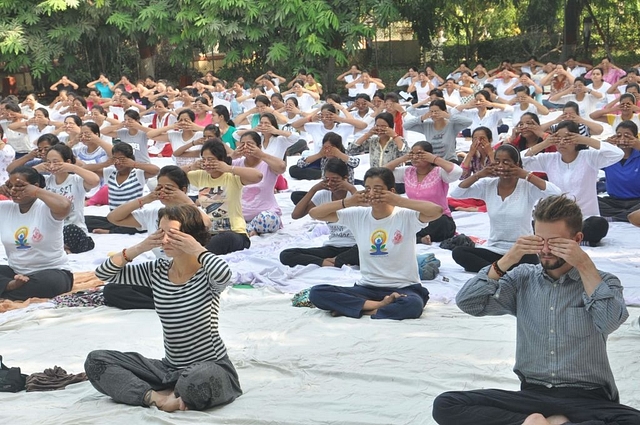
Mental Health: Yoga Can Prove Decisive If Introduced As Part Of Early Stage Preventive Care
Yoga as a discipline has much to offer in the area of mental health but requires both the scientific and yogic community to work hand in hand.
With growing complexities of the real and virtual world, mental health has become a significant area of interest and concern. Observing World Mental Health Day on 10 October every year is not without a reason. The World Health Organization (WHO) says that half of the cases of mental illness begins as early as 14 years of age, and has serious consequences on the society at large. When celebrities talk about this subject openly, sharing their personal struggles, it paves the way for mental illness to be looked at as a clinical condition, as real as any other health issue rather than a stigma. Significant efforts are being undertaken to include the mental wellbeing of individuals in the healthcare policy and practices. The Mental Health Care Act, passed in India in 2017 and came into effect in July 2018, is one such. “Happiness” of citizens is becoming a concrete goal for nations.
As per National Mental Health Survey data 2015-2016, it is estimated that excluding tobacco use disorders, mental morbidity of individuals above the age of 18 years was 10.6 per cent. About 13.7 per cent of the population surveyed, nearly 150 million Indians are in need of active intervention. Common mental disorders, including depression, anxiety and substance abuse are a huge burden, affecting nearly 10 per cent of the population. Shockingly, one in 20 people in India suffer from depression. High suicidal risk is an increasing concern and productive age groups are the most affected. Mental health issues are complex to diagnose and cure. The number of people undergoing treatment and using anti-depressants is increasing on a daily basis. Global revenue for anti-depressants is said to grow to nearly $17 billion by 2020.
While the current mental health care infrastructure across states in India is trying to keep pace with varied needs such as doctor-patient ratio, rehabilitation centres, it is pivot to look at solving the problem of mental health holistically. The WHO recommends: this investment (towards mental health) should be linked to programmes to raise awareness among adolescents and young adults of ways to look after their mental health and to help peers, parents and teachers know how to support their friends, children and students.
Indian health systems such as ayurveda and yoga have interesting insights to offer. But what is crucial is to utilise and share infrastructure across health systems, for which looking at interdisciplinary research is critical and points of confluence of traditional and modern knowledge systems are needed. Active research and evidence-based studies can help bring these traditional knowledge systems into policy formulation for mental healthcare.
An interdisciplinary approach to understanding yoga through neurocognitive genetic sciences and expanding the body of knowledge through yogic practices and first-person observations, is an emerging field that offers a plethora of research opportunities, which will help look at solving mental health issues non-invasively and effectively. One may call it ‘yogic neuroscience or yogic neurogenetics’, to aptly capture the multidisciplinary and scientific nature of the domain.
Yoga as therapy has been prescribed across allopathic hospitals in Western countries for issues such as post-traumatic disorder, handling anxiety and stress levels, psychosis, attention related mental disorders and many such. Global institutions like Harvard and Stanford are scientifically exploring the impact of yogic practices and meditation on the brain. Establishing systematic research in the field of yogic neuroscience/neurogenetics will help in answering certain grey areas present in the body-mind-consciousness/cognition framework of health.
The current state-of-the-art research in the area of yoga and neuroscience is utilising technologies such as fMRI, EEG, MEG etc, to understand how various yogic techniques have a regenerating and healing impact on the brain and mental health. The results of these studies demonstrate very high potential for yogic practices including asana, pranayama and dhyana to treat mental conditions and ensure general well-being of practitioners. These studies focus both on empirical and phenomenological approaches to yogic neuroscience. With the field of neuroscience itself expanding to include epigenetics, neurochemistry, behavioural and cognitive sciences, yogic neuroscience has immense scope to grow in these directions.
Such research is paving the way for changing the global opinion about yoga from a mere set of physical exercises for a healthy body to a more holistic approach to all-round development of the individual including emotional and cognitive health.
Recent research in medical science has recognised more than 1,000 neurological conditions and the annual investment in them is about $800 billion. While a heightened understanding of these disorders is leading to more investments in biopharma, it comes with a host of side-effects and complications. Hence, there is a global movement to more early-stage preventive care and that is where yogic practices have an important role to play.
Yogic practices can have immense benefits in solving mental health issues as they are recognised as less invasive, can be self-administered under guidance, cater to preventive care and impact fundamental aspects of the body and mind that lead to multiple simultaneous health benefits. What is currently impeding the large scale adoption at the policy level is the dearth of scientific studies and support (monetary and educational) that explore yogic neuroscience/neurogenetics from multiple angles and dimensions, the way drug research and gene therapy studies are progressing.
Yoga as a discipline has much to offer to solve the problems of mental health but requires both the scientific and yogic community to work hand in hand to provide for necessary research directions.